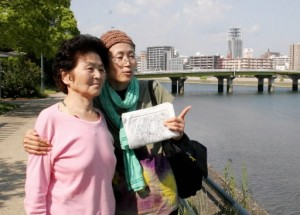Mother of second-generation South Korean survivor and activist visits Hiroshima, vows to carry on will of late son
May 22, 2015
by Masakazu Domen, Staff Writer
Lee Gokji, 74, a resident of Busan, South Korea, traveled to Japan to visit the site of her former house in Naka Ward, Hiroshima, where she experienced the atomic bombing. She is the mother of the late Kim Hyong-Ryul, who helped spearhead a movement of second-generation A-bomb survivors in South Korea calling for assistance for survivors of the atomic bombings and their offspring. She said, “I can’t allow my son’s efforts to have been in vain.” She stressed the horror of the atomic bomb and renewed her determination to continue her son’s campaign which calls on both the Japanese and the South Korean governments to increase their support for A-bomb survivors.
The house where she once lived was located at 1-chome, Funairi Minami, now part of Naka Ward, about 2 kilometers from the hypocenter. She arrived in Hiroshima on May 1, together with Japanese and South Korean supporters. While recalling the conditions at the time of the atomic bombing, which linger in her mind, she mourned her son, who died in 2005 at the age of 34.
“My son was compassionate and honest. If I hadn’t been exposed to the atomic bomb, he could have lived a life with much less suffering,” she said.
According to Ms. Lee, her son caught colds easily from the time he was a child. He was repeatedly hospitalized with pneumonia and diagnosed with congenital immune disorder around the age of 25. In South Korea, where discrimination against A-bomb survivors is persistent, he formed an association of second-generation South Korean survivors. He devoted himself to efforts to establish a system which would provide assistance to second-generation survivors, too, but he eventually fell ill.
Ms. Lee was born in Hiroshima and lost her father to the atomic bomb. She then returned to South Korea with her mother. After she got married, she had five children, but led a difficult life as she took care of her son. Following his will, she and her husband are now involved in the movement he led.
“The atomic bombing inflicted great suffering on the survivors and their families. I hope the Japanese government and people will support and provide us with the assistance we need to restore our human rights,” Ms. Lee said.
(Originally published on May 11, 2015)
Lee Gokji, 74, a resident of Busan, South Korea, traveled to Japan to visit the site of her former house in Naka Ward, Hiroshima, where she experienced the atomic bombing. She is the mother of the late Kim Hyong-Ryul, who helped spearhead a movement of second-generation A-bomb survivors in South Korea calling for assistance for survivors of the atomic bombings and their offspring. She said, “I can’t allow my son’s efforts to have been in vain.” She stressed the horror of the atomic bomb and renewed her determination to continue her son’s campaign which calls on both the Japanese and the South Korean governments to increase their support for A-bomb survivors.
The house where she once lived was located at 1-chome, Funairi Minami, now part of Naka Ward, about 2 kilometers from the hypocenter. She arrived in Hiroshima on May 1, together with Japanese and South Korean supporters. While recalling the conditions at the time of the atomic bombing, which linger in her mind, she mourned her son, who died in 2005 at the age of 34.
“My son was compassionate and honest. If I hadn’t been exposed to the atomic bomb, he could have lived a life with much less suffering,” she said.
According to Ms. Lee, her son caught colds easily from the time he was a child. He was repeatedly hospitalized with pneumonia and diagnosed with congenital immune disorder around the age of 25. In South Korea, where discrimination against A-bomb survivors is persistent, he formed an association of second-generation South Korean survivors. He devoted himself to efforts to establish a system which would provide assistance to second-generation survivors, too, but he eventually fell ill.
Ms. Lee was born in Hiroshima and lost her father to the atomic bomb. She then returned to South Korea with her mother. After she got married, she had five children, but led a difficult life as she took care of her son. Following his will, she and her husband are now involved in the movement he led.
“The atomic bombing inflicted great suffering on the survivors and their families. I hope the Japanese government and people will support and provide us with the assistance we need to restore our human rights,” Ms. Lee said.
(Originally published on May 11, 2015)







